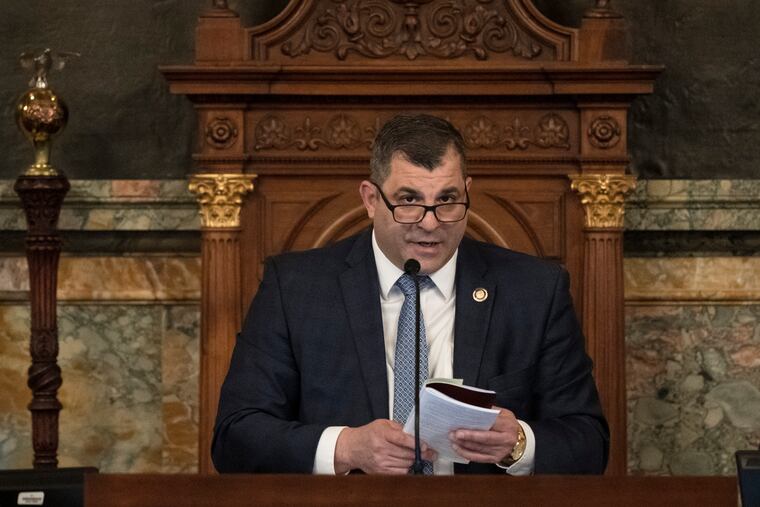Pa. House advances bills — for the 4th time — to allow child sex abuse survivors to file civil suits
The bills have an uncertain future. State Senate GOP leaders want to combine them with voter ID requirements and changes to the state's regulatory process, which Democrats oppose.

For the fourth time in six years, the Pennsylvania House of Representatives passed two measures that would allow adult survivors of childhood sexual abuse to file civil lawsuits against their perpetrators or the institutions that protected them.
The two bills now go to the state Senate, where their fate is less certain.
Republican Senate leaders combined their own version of the legislation last month with two other measures that Democrats vehemently oppose: requiring voter IDs at the ballot box and changing the way Pennsylvania changes its regulations.
The measures passed in the House Friday would both create a two-year window for childhood sexual assault victims to file civil suit — but through different means. One is a constitutional amendment, which passed 161-40, and the other a statutory change that passed by a slightly narrower margin, 134-67.
Friday’s passage was particularly meaningful for House Speaker Mark Rozzi (D., Berks), who is a victim of childhood sex abuse and has made the bills his top priority since his surprise election as speaker last month.
“As a 13-year-old boy being raped in the shower, do you think I knew what a statute of limitations was? And that my statute of limitations was two years?” Rozzi said. “That’s why we’re giving these two years back to these victims. And they sure as hell deserve them.”
Rozzi already accepted a settlement from the Diocese of Allentown, but said he continues to advocate for the issue for his “brothers and sisters” — other childhood sexual abuse victims. Reps. Jim Gregory (R., Blair) and La’Tasha Mayes (D., Allegheny) said they are also survivors of childhood sexual abuse and supported the bills’ passage.
Clergy abuse victims have been asking the state General Assembly for a path to relief since at least 2005, when the first grand jury report was released revealing abuse by priests in the Archdiocese of Philadelphia.
Survivors’ voices have gotten louder in recent years, after a 2018 statewide grand jury report found credible allegations of sexual abuse by more than 300 priests across six dioceses, with thousands of victims.
“It is time to pass a statutory window as quickly as possible so that survivors suffer no more than they already have and so that the commonwealth’s parents learn as soon as possible the truth about where their children are at risk,” said Marci Hamilton, founder and CEO of the advocacy group Child USA.
Victims were close to getting this long-sought relief in 2021, before an administrative error by the state Department of State forced lawmakers to restart the constitutional amendment process. Constitutional amendments must pass in two consecutive legislative sessions before they go before voters. The Legislature again passed the constitutional amendment for the first time last year, meaning it could appear on the November ballot for voters’ approval.
The issue has received strong bipartisan support each time it has passed the House. The dual-pathway — providing Senate leaders with both options — would allow victims to begin pursuing relief after the November 2023 election, or even sooner if they pass the statutory change, Rozzi said.
However, the Senate GOP leadership has remained the biggest barrier to justice for victims, House lawmakers and advocates said.
Senate Majority Leader Joe Pittman (R., Indiana) said in a statement Friday that the Senate already “fulfilled and completed our commitment” to survivors as part of their omnibus bill of constitutional amendments. That means the House — where Democrats hold a narrow majority — would have to approve the Senate’s version that includes amendments they don’t support: the voter ID and regulation measures.
Several House Republicans who support the legislation for sex abuse victims said they feared that errors in the introduction of the bills or strict special session rules could put it in danger of legal challenge. Others said the whole process would be a waste of time if the Senate blocks the bills.
“There is one path and one path only to ensuring victims in this commonwealth see the justice they so desperately deserve,” said Rep. Seth Grove (R., York). That fix isn’t the House proposals, he said: It’s the Senate’s omnibus bill of three constitutional amendments.
Rozzi kept the House closed for weeks until leaders reached an agreement on special session rules to finally pass the legislation for child sexual abuse victims.
And his time as the House’s top official could soon come to an end. Rozzi previously told The Inquirer he would reconsider his speakership after he got the childhood sexual assault measures across the finish line.
First, however, the House will come together next week to set regular session rules. Rozzi will propose a number of changes, including one to expand protections for victims of sexual harassment by House members.
“This has been a tumultuous time in the House. And that is OK and normal during times of transition,” Rozzi said in closing remarks Friday. “But despite our procedural bickering, at the end of the day, when it was time to be there for victims, the House once again came together in a bipartisan way.”